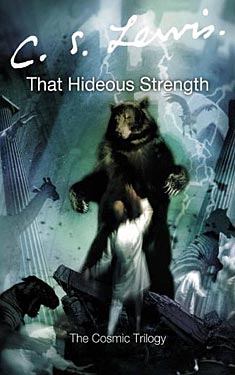C.S. Lewis
Completed 11/15/2017, reviewed 12/18/2017
2 stars
This book is the third in C.S. Lewis’ Space Trilogy. And it nearly put an end to my blogging
career. When I finished reading it, I
didn’t even want to review it. I found
it that dull and uninteresting. I put
off the review for over a month. I think
I was somehow expecting something akin to Lord of the Rings when I began this
trilogy, mostly because I knew Tolkien and Lewis were friends and critiqued
each other’s works. They couldn’t have
been farther apart. I was also expecting
something great because in my Fantasy Lit class in college, we had the choice
to read this book or Earthsea Trilogy. I
chose Earthsea, but I thought THS would be equally as good. I was so disappointed.
 The book is about Mark Studdock, a sociologist at an Oxford
like school who is drawn to work at an organization called N.I.C.E., the
National Institute for Coordinated Experiments.
Unbeknownst to Mark, its mission is to take over the planet. Mark’s wife Jane has terrible visions of the
near future. She meets up with people
who believe her visions are real and indictments of N.I.C.E. These people are led by Elwin Ransom, the hero
of the previous two books. Their mission
is to put an end to N.I.C.E.
The book is about Mark Studdock, a sociologist at an Oxford
like school who is drawn to work at an organization called N.I.C.E., the
National Institute for Coordinated Experiments.
Unbeknownst to Mark, its mission is to take over the planet. Mark’s wife Jane has terrible visions of the
near future. She meets up with people
who believe her visions are real and indictments of N.I.C.E. These people are led by Elwin Ransom, the hero
of the previous two books. Their mission
is to put an end to N.I.C.E.
The book is very British.
Manners play an important role as to why Mark can’t get out of N.I.C.E. They are more sinister than that, but it just
feels like he’s too polite to put his foot down when he has the chance. It’s also very old-fashioned. There’s one woman who works for the
organization who is every negative Lesbian stereotype, right down to the cigar
chomping. It’s so bad, it’s
offensive. Even knowing that this book
was written in the ‘40s, I couldn’t help but feel offended.
I read many reviews of this book looking for like-minded
readers, but there weren’t many. One
thing many fans agree on is the prose. I
thought it was overbearing. It was simply
just a tool for converting his philosophical arguments into fiction. It’s about natural law versus logical
positivism. I didn’t know this until
after I began reading the reviews after finishing the book. I think I might have gotten a little more if
I knew that ahead of time. It’s pretty
clear though, that N.I.C.E. represents the more atheistic logical positivism
and Jane and co. represent the more theological and spiritual natural law. N.I.C.E is mean and destructive and pushes
the good little people of England out of their country homes and into the
terrible city. Jane is wholesome and
mystical and pastoral. Ugh.
Make me barf.
I’m giving this book two stars out of five because it did
have some moments. I did rather like the
appearance of Merlin. On the whole, I’m
not fond of Lewis from my experience with the Space Trilogy. Maybe I’ll like Narnia, if I get around to
reading it. But I feel like I wasted
several weeks reading books that propagate a moral argument thinly couched in near-science
fiction, or I guess this was fantasy since Merlin showed up. Life is more complex than any one
philosophical statement and I believe anyone who thinks otherwise is terribly naïve.
I started the first part of this trilogy but didn't finish it. Like you, I found it stale and dull as well as very dated. Out of the Narnia books, I loved "The Lion, the Witch and the Wardrobe" when I was a child. Re-read it last year and am convinced it is a book that belongs to our childhood days. "The Magician's Nephew" is pretty good, but should be read after "Lion, Witch, Wardrobe". I've heard that "The Silver Chair" is okay, but the others aren't worth reading unless you are a child.
ReplyDelete